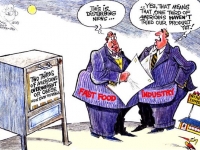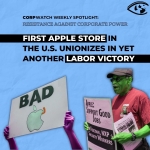Food Giants on the Run
Industry Rewrites Laws to Avoid Liability

Growing up, Jazlyn Bradley ate the majority of her meals at McDonald's. As frequently as five times a week, her diet consisted of McMuffins for breakfast, Chicken McNugetts for lunch, and Big Macs for dinner. By the time she was 19-years-old, this resident of the Bronx, New York, stood 5 feet, 6 inches tall and weighed 270 pounds and was diagnosed with diabetes, high cholesterol and hypertension.
Bradley and other children like her are named in a class action lawsuit that blames the fast food giant for misrepresenting its products as nutritious and not revealing potential hazards. Bradley's father, Israel, a single parent, says he never saw anything in the restaurants that informed him of the food's ingredients. "I always believed McDonald's was healthy for my children," he said in court papers.
While this case remains the only one of its kind filed anywhere in the nation, corporate America has fought back with the help of politicians in a manner that poses a serious threat to consumers' ability to seek redress through the legal system.
Over the past three years, a combination of media focus on ominous government reports on the nation's obesity epidemic, the publication of exposé books such as Fast Food Nation and Food Politics, and the success of the documentary, SuperSize Me, has placed major food companies on the defensive. Not taking the finger-pointing lying down, corporations such as McDonald's and Kraft are putting their public relations machinery into overdrive, in an attempt to position themselves as ambassadors of public health. Meanwhile, behind the scenes, the companies are also lobbying to protect themselves from potential liability in the courtroom.
Rewriting Tort Law
Typically legal cases brought against someone who deliberately, or through
carelessness, has caused harm to another person or their property, are known as "tort" lawsuits. (The word "tort" is from a French word meaning "a wrong.") The system of tort laws is critical to providing people who are harmed a mechanism for obtaining compensation, but these laws are now under attack.
In Congress and in state legislatures around the country, bills are being proposed to shield the food industry from allegedly "frivolous" lawsuits related to obesity. With names like the "Commonsense Consumption Act," such bills have now passed in 16 states and are pending in 22 more. Louisiana started the trend in 2003 and the other states have steadily followed. The governor of Kentucky signed his state's bill into law on March 8, 2005 and the movement shows no signs of abating.
A federal version of the state bills, called the "Personal Responsibility in Food Consumption Act," passed the House of Representatives in the US Congress last year by an overwhelming margin and is now proceeding to the Senate, where its chances are less certain. If it does pass this next hurdle and is signed into law by the president, the legislation would shield all sectors of the food industry from lawsuits brought for obesity or obesity-related health problems and would apply to cases brought in both federal and state courts.
The author of the federal bill, Congressman Ric Keller, a Republican Representative from Florida, and an acknowledged fast-food fan whose top donors include Outback Steakhouse and the National Beer Wholesalers Association, defends the federal measure by claiming that it's "narrowly drawn" and "does not immunize the food industry."
What may have started as a relatively narrow concept has mushroomed into a state-by-state onslaught with legislative language that in some states is overly broad, while in others, simply absurd. For example, the proposed California bill goes beyond obesity to include any "other injury caused by the long-term consumption of food."
States such as South Dakota are even protecting local ranchers of obscure animals such as bison and ostriches. Not to be outdone, New Mexico's bill is called the "Right to Eat Enchiladas Act" and Wyoming has even written in homeless shelters, soup kitchens, and food banks.
It's the Documents, Stupid
"We need to take steps to make sure that the restaurant industry doesn't become the next Big Tobacco," says Bryan Malenius, chief of staff for Ric Keller.
A string of successful US tobacco lawsuits in the late nineties -- which came about after decades of the industry effort to fight off liability -- is still fresh in the minds of everyone involved in this debate. In 1999, a series of lawsuits brought by state governments against the tobacco industry snowballed to prompt a federal lawsuit. The federal government's case outlined how the tobacco companies had "engaged and executed -- and continue to engage in and execute -- a massive 50-year scheme to defraud the public." This well-documented trail of industry deception was critical to shifting public opinion, giving policymakers the support they needed to pass significant public health measures that have reduced smoking rates and lessened exposure to secondhand smoke.
Yet, despite all the fear of history repeating itself, the McDonald's case remains the only obesity-related lawsuit filed, and its outcome is still pending. Wisconsin Governor Jim Doyle said it best as he vetoed the bill in his state: "This is a solution in search of a problem." So why then, is industry so determined to shield itself from liability if there's only one lawsuit pending?
Attorney Joseph Price of the defense law firm, Faegre and Benson, which represents clients such as Archer Daniels Midland (not for obesity litigation) testified in favor of the bill currently pending in Minnesota. He says that the plaintiffs' attorneys have repeatedly promised to make this kind of litigation the next tobacco, so potential defendants should take heed. "I take the plaintiff's bar at their word," he said. "If they say they are going to turn this into the next big mass tort, you hunker down and do whatever you have to do to make sure this doesn't happen to you"
What scares food companies even more than costly jury verdicts is the prospect of the discovery process-when lawyers are allowed access to the defendant's documents and other inside information-unearthing damning information about dishonest industry practices. This in turn, can open the door to a plethora of new government regulations.
An avalanche of damning documents discovered through litigation against the tobacco industry revealed so much information that an entire research group at the University of California is currently dedicated to its study. The food industry has learned from tobacco that litigation is a powerful public interest tool.
What exactly will be revealed through litigation that would harm Big Food? One possibility is evidence of efforts to addict consumers to its products. According to information uncovered by the Physicians Committee for Responsible Medicine, some food manufacturers deliberately target consumers who are vulnerable to certain food addictions. Recent studies reveal that some unhealthy foods-such as chocolate, sugar, meat, and cheese-are physically addictive. Overeaters also demonstrate typical addiction behaviors such as craving, loss of control, and relapse. Lawsuits could help uncover the extent to which the food industry has known about, concealed, and taken advantage of such food addictions.
Controlling the Terms of the Debate
In addition to avoiding document production, another important purpose of this lobbying crusade is to apply corporate spin to maximum effect. The food industry likes to frame the debate around the cause of obesity as being solely personal responsibility. The mantra behind the "Personal Responsibility in Food Consumption Act" basically says: if you're obese, you have no one to blame but yourself for eating too much.
At a food industry conference last fall, John Fritchey, a member of House of Representatives for the state of Illinois, author of his state's bill said his goal was to send the message that personal responsibility still has a place in society. "Sometimes the finger of blame needs to be pointed in the mirror," he said.
The idea is that if people believe that only individuals are responsible for their own eating behaviors, then companies cannot be blamed for the consequences, whether through litigation or legislation. This strategy conveniently absolves corporations from any accountability for the billions of dollars they spend each year on marketing their unhealthy products.
Also, often overlooked is how people in wealthier areas have much greater access to healthier foods. There are as many as four times the number of supermarkets -- which carry a wide variety of fresh produce -- in white neighborhoods than in most predominantly black ones. Often, in neighborhoods like the one where Jazlyn Bradley lived, McDonald's and the corner liquor store are the only food options available.
McFrankenstein Chicken
The industry spin on the McDonald's case is that it's simply about getting fat from eating too much fast food. But Ellen Fried, who teaches food law at New York University, says the suit is not about obesity per se, but about how McDonald's has deceptively advertised its food as healthy.
"You have to go back a couple of years, before all the attention to this issue got started," says Fried. "Most people didn't think that going to McDonald's every day was a problem. It was advertised as healthful and perfectly OK to eat everyday. The lawsuit is not about 'I ate this and it made me fat," it's about what you told me about eating this way, or didn't tell me."
The lawsuit also alleges that McDonald's failed to advise customers of risks that were not common knowledge, due to unfamiliar ingredients. In his initial decision, the judge in the case made this statement about Chicken McNuggets. "Rather than being merely chicken fried in a pan, [they] are a McFrankenstein creation of various elements not utilized by the home cook." Next the judge listed the rather lengthy and strange-sounding ingredients contained in a Chicken McNugget. In addition to chicken, they are:
Water, salt, modified corn starch, sodium phosphates, chicken broth powder (chicken broth, salt and natural flavoring (chicken source)), seasoning (vegetable oil, extracts of rosemary, mono, di- and triglycerides, lecithin). Battered and breaded with water, enriched bleached wheat flour (niacin, iron, thiamine, mononitrate, riboflavin, folic acid), yellow corn flour, bleached wheat flour, modified corn starch, salt, leavening (baking soda, sodium acid pyrophosphate, sodium aluminum phosphate, monocalcium phosphate, calcium lactate), spices, wheat starch, dried whey, corn starch. Batter set in vegetable shortening. Cooked in partially hydrogenated vegetable oils, (may contain partially hydrogenated soybean oil and/or partially hydrogenated corn oil and/or partially hydrogenated canola oil and/or cottonseed oil and/or corn oil). TBHQ and citric acid added to help preserve freshness. Dimethylpolysiloxane added as an anti-foaming agent.
| Big Food's Lobbying Machine Congressman Ric Keller's chief of staff, Bryan Malenius, boasts that every food company and trade association out there is interested in the legislation, both at the federal level and in the states. "We've had lots of wonderful support from the industry," he says. Of the major food trade associations, the National Restaurant Association (NRA) and the National Food Processors Association (NFPA) have been the two key players convincing legislators to sponsor bills. At a food industry litigation conference last fall, Scott Riehl, NFPA's vice president of Government Affairs told his colleagues that lobbying for these bills "is a deliberate strategy to pre-empt litigation." The National Restaurant Association has 60,000 member companies representing more than 300,000 outlets. NRA works quite effectively in tandem with each state's restaurant association, providing model legislation, talking points, and additional technical assistance. According to Malenius, "the National Restaurant Association has done a wonderful job of helping coordinate these state-by-state efforts and we are all reading off the same sheet of music." In addition to the trade associations, another important Last November, the Citizens for Responsibility and Ethics in |
Ironically, it's exactly this sort of information that is being kept from consumers thanks to industry lobbying to ensure that restaurants are not required to label ingredients in menu items. Because consumers are often left in the dark, the court system provides a way to shine a light on hidden corporate practices, while compensating victims.
Absolution in Perpetuity
Of course, attempting to bar potential litigants from the courthouse is a popular political idea these days. The Bush administration is currently engaged in a much broader crusade against the civil justice system, turning trial lawyers into yet another scapegoat for America's economic woes.
Several "tort reform" bills are currently making their way through Congress, including measures that would place caps on awards for victims of asbestos exposure as well as medical malpractice. Bush has already signed a bill into law that addresses how lawyers can bring class action cases.
According to Joanne Doroshow, executive director for the Center for Justice and Democracy,
previous attempts by certain industries to single themselves out for
special liability protection have proven to be a successful tort reform
strategy. For example, Congress passed a bill in 1994 to shield the
aviation industry and another in 1998 that provides immunity to
suppliers of medical implants. Also, she says, "gun manufacturers keep
trying, year after year, to get special liability protection."
"Many industries are fearful that
if they have been engaging in misconduct over the years that they are
going to be subject to liability, which of course they should be," says Doroshow. She explains that industries will often "see a problem looming on the
horizon in terms of their liability exposure."
Experts say that these bills could make these companies completely unaccountable to the public. Mindy Kursban, executive director and general counsel for Physicians Committee for Responsible Medicine. "Questions regarding the role of the food industry in our nation's obesity epidemic are just now being brought to light. Rather than immediately absolve the entire industry of all potential liability, we should learn more about how they have contributed to this public health crisis," she said.
And if the public does learn more, it could shed a whole new light on the food industry -- and on corporate accountability. Until then, Doroshow says that the food industry is obviously trying stave off any future legal responsibility. "Of course they don't say that; they try to make it sound like litigation is a major threat to them now. Even if it's not, they've got the money to do the lobbying, so why not do it?"
Michele Simon, a public-health attorney who teaches health policy at UC Hastings College of the Law, directs the Center for Informed Food Choices and is currently writing a book about food industry lobbying.
- 181 Food and Agriculture


